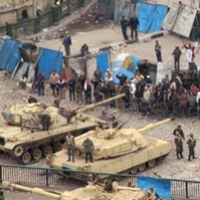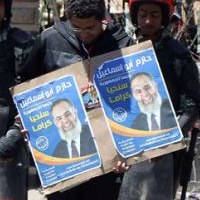![]()
Wed, Feb 02, 2011 | The Rubin Report | By Barry Rubin

Activists of Civil Society lighting candles during a walk against murder of Governor Punjab Sulman Taseer, in Hyderabad, Sindh Pakistan on January 05, 2011.
What’s Really Wrong with Western Understanding of the Middle East?
An article that can (and should) change Western understanding of the Middle East.
Rarely has a mass media article shaken me up as this one does. It is a rare, intense, view of what the Middle East is really like nowadays, though it is about Pakistan, on the eastern end of the region, in Pakistan. I wrote this before the events in Egypt but it certainly applies there as well.
This is to take nothing away from the brave demonstrators in Egypt, and especially the moderates and truly pro-democracy people among them. In fact, the odds they face and the relatively low numbers of people who want such an outcome makes them all the braver and more admirable.
But let’s remember that both the lawyers’ and doctors’ associations in Egypt are dominated by the Muslim Brotherhood.
The title of the article is, “A governor’s assassination has delivered Pakistan to the extremists,” by Pamela Constable in the Washington Post.
The background is the assassination of a government official because he suggested easing the country’s blasphemy law, which has often been used against Christians or for personal vendettas. Constable notes that the law, “Makes any purported slur against the prophet Muhammad–even a misinterpreted remark or a discarded Koran–grounds for execution.”
She describes how, “At a fashionable plaza in this serene Pakistani capital, a few dozen people gather in the evenings at the spot where provincial governor Salman Taseer was gunned down on Jan. 4.”
But meanwhile, fifteen miles away “in a working-class alley of Rawalpindi, thousands of people flock each day to the home of Mumtaz Qadri, the elite police guard who killed Taseer. Qadri is in jail now, but the site has become a shrine to what many Pakistanis see as his heroic act against a blasphemer who insulted their prophet. Someone has even put up posters of Qadri riding a white horse to heaven.”
In short, the masses are with the extremists. There are dozens for moderation and democracy; thousands for revolutionary Islamism. She continues:
“In the days since Taseer’s death, Pakistan has become a different country. The veneer of Western democracy has been ripped away, the liberal elite has been cowed into silence, and the civilian government has beaten a hasty retreat from morality, authority and law. Islamic extremist groups, once dismissed as unable to win more than a few seats in Parliament, are filling the streets, with bearded acolytes waving flags and chanting like giddy crowds at a post-game victory rally.”
I think it was always like that, more or less, under the veneer so often screened out of sight by the cosmopolitan types that journalists usually hang out with. Now it is just coming more to the surface, and to the attention of Western reporters. When I was last in Pakistan, my host took me to the upscale Sin Club where he was most disappointed when I didn’t want to drink the expensive scotch he ordered.
A very admirable American diplomat, the only one I know who predicted the Iranian revolution, explained to me that it was easier to have one cup of tea with a cabinet minister than 50 cups of tea with workers, peasants, and small merchants. Constable continues:
“Suddenly, a crucial U.S. ally in the fight against terrorism seems incapable of stopping a tide of intolerant and violent Islam at home — [that’s Pakistan today and not, perhaps, Egypt in a couple of years, BR] — raising doubts about Pakistan’s ability to play a constructive role in the war against the Taliban or to help the United States extricate its forces from Afghanistan, Pakistan’s northern neighbor.”
Well, plenty of other things have raised doubts, like the high levels of cooperation with the terrorists and Pakistani intelligence’s involvement in helping them. but again, the tide and the doubts can no longer be ignored.
But this should not just be a story about Pakistan but a story of what’s happening all the way to Morocco in the west and Indonesia far to the southeast. While Westerners obsess about Israeli-Palestinian issues as the center of the universe and think that flattery and kind words will make the radicals go away, there is a volcano seething out there. The lava is also flowing down onto Gaza and Lebanon, Egypt and Iraq, and elsewhere.
Now, contrast these two paragraphs. First, Constable:
“Qadri, who happily confessed to murdering the politician he was assigned to protect, has little chance of being convicted. Instead of suffering ostracism, he was greeted with handshakes and garlands by courthouse lawyers, who offered to defend him [for free]. The provincial court system, notorious for freeing radical Islamic leaders, is unlikely to condemn a national religious hero.”
Now, the New York Times:
“Cheering crowds have gathered in recent days to support the assassin who riddled the governor of Punjab with 26 bullets and to praise his attack — carried out in the name of the Prophet Muhammad — as an act of heroism. To the surprise of many, chief among them have been Pakistan’s young lawyers, once seen as a force for democracy.”
Why should anyone be surprised? The “many observers” are certainly not Pakistanis, who know better, but Western observers who assume that lawyers must be moderate, modernizing people. But in Egypt and Jordan, for example, the lawyer’s associations are controlled by the Muslim Brotherhood. While in the West law is pretty secular, in Muslim-majority countries it is closely (to varying extents) linked to Islamic law.
Remember President Obama’s terrorism advisor who explained that Hizballah couldn’t be terrorist because it had so many lawyers in its ranks? (That’s not a joke. He did say it.) Well, this may come as a shock to you all but even lawyers can be terrorists, and their bills are paid in blood.
In the West, doctors are modernist, relatively moderate people generally, with a very high proportion of atheists while in Muslim-majority countries many — though by no means all — are radical Islamists. Consider the al-Qaida leader al-Zawahiri, the Palestinian terrorist Dr. Wadi Haddad and many others. Even some Muslim doctors living in the West who have been involved in terrorist attacks.
So both much of the masses and much of the elite in many places want an Islamist revolution. They don’t want democracy. The rules by which Westerners think about their own politics and societies do not apply to these societies.
Remember Obama’s speech in Cairo? As usual, William Shakespeare said it best, “There are more things in heaven and earth…Than are dreamt of in your philosophy.”
Here’s the reality after billions of dollars in U.S. aid to Pakistan:
“In Friday sermons and at many levels of Pakistani society, one hears warnings about creeping Westernization, secular culture and forceful aggression against Islam by America and its allies. When Pope Benedict XVI called for a repeal of Pakistan’s blasphemy law this month, some Muslim clerics decried it as part of the foreign conspiracy and said the pope was inviting attacks on minority Christians in Pakistan.”
Is this all so new? Check out my analysis of the shocking Pew poll results, especially for Egypt and Jordan. (I didn’t analyze the Pakistan and Nigeria results but they are also extremely radical.)
In Pakistan, no one wants to challenge the public wrath (in pre-PC days we’d be using the word “fanatical”).
But there’s much, much more. I think about the Syrian woman television producer who, though an Alawite, cheered on the radical Islamists who’d fire her from her job, confine her to her home at best, and maybe execute her as an Alawite heretic. I think of the crazed hatred against Israel and the West of the Islamists and now even mainstream clerics. How when the West views itself as being generous and repentant, the other sees this behavior as showing weakness.
And I think of the naive, well-intentioned Western elites who explain that it is all “our” fault, how there is no real difference between religions (not just in theory but as presently practiced), and how any critical analysis of Third World societies is some form of evil, or how concessions will please and appease the problems away.
This is not about Israel or the boundaries of Jerusalem. It is about revolution and the fate of one billion people.
Ladies and gentleman, the unstoppable force is about to crash into the supposedly immovable barrier. And the barrier doesn’t even know it; while those who should be manning it are busy dismantling it.
The above paragraph was written before the events in Egypt.



 RSS
RSS










What's Really Wrong with #Western Understanding of the Middle East? | #Pakistan #Egypt #Islamism http://j.mp/gIYCsx
What's Really Wrong with #Western Understanding of the Middle East? | #Pakistan #Egypt #Islamism http://j.mp/gIYCsx http://ff.im/ximw6
RT @CrethiPlethi: What's Really Wrong with #Western Understanding of the Middle East? | #Pakistan #Egypt #Islamism http://j.mp/gIYCsx ht …
RT @CrethiPlethi: What's Really Wrong with #Western Understanding of the Middle East? | #Pakistan #Egypt #Islamism http://j.mp/gIYCsx